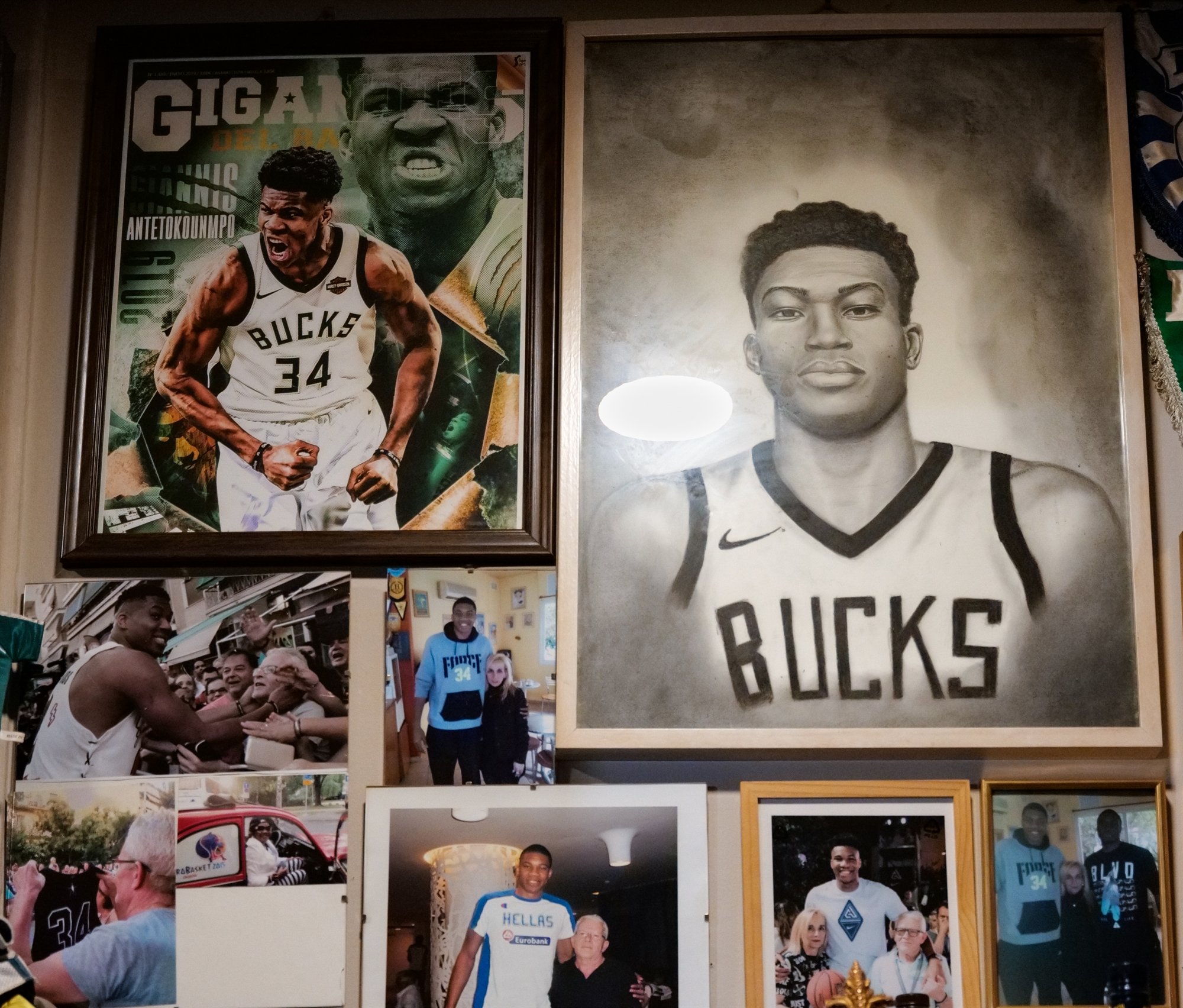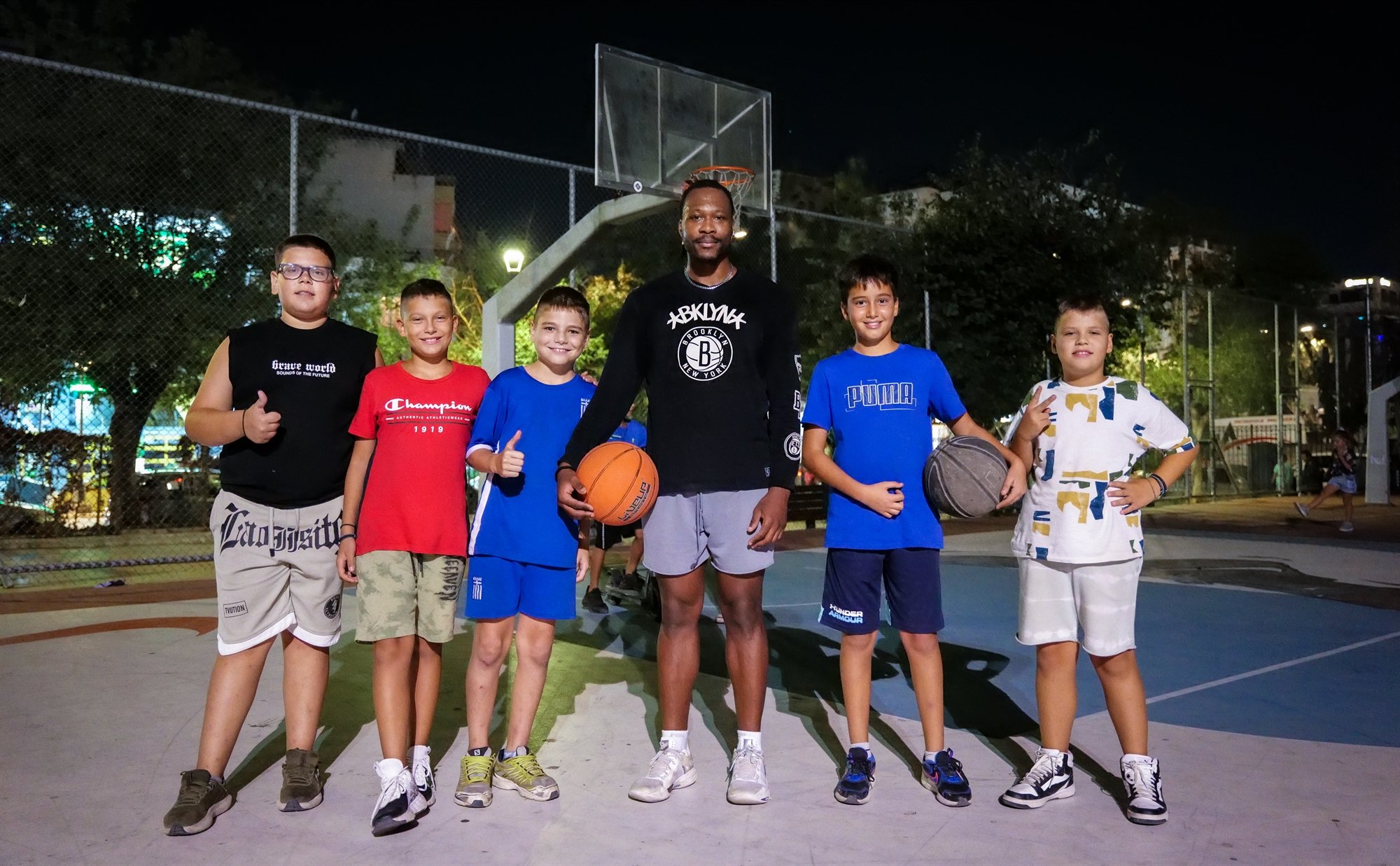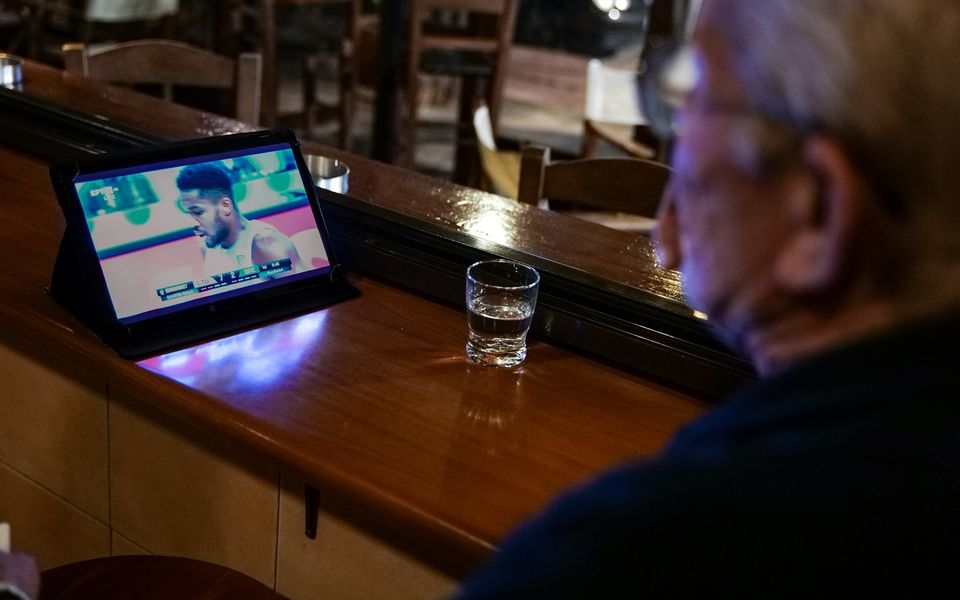Driving toward Sepolia, northwestern Athens, it’s impossible not to think of the humble years Giannis Antetokounmpo spent in this neighborhood with his family – years the star athlete has often recalled with both emotion and anger. Reaching Dyrrachiou Street via Kifissou Avenue – where the basketball court on which Giannis made his first dunk was recently renovated with his own money – the scene shifts.
Cars race furiously down the two-way road, teenagers fill the countless chain cafes that have sprung up in recent years, while the voices of children playing basketball on the neighborhood’s only court – its floor sporting a graffiti portrait of the NBA star – are almost drowned out by the noise. “Giannis took off from here,” the locals say.
Directly across the street, at the Kivotos cafe, sits Giannis Tzikas – the “angel,” as Giannis calls him, for the kindness and support he showed him and his brothers when they were young. He’s getting ready to watch Greece face Lithuania. With the national team already up by 10 points in the first quarter, the basketball fan recalls the first time he met the Antetokounmpo children.
 The Kivotos cafe in Sepolia, where Giannis spent time as a child, now stands as a shrine to the great athlete. [Konstantinos Georgopoulos]
The Kivotos cafe in Sepolia, where Giannis spent time as a child, now stands as a shrine to the great athlete. [Konstantinos Georgopoulos]
“It was summer, and the little ones would come by. Once, twice, three times. We’d give them orangeade, maybe a milkshake. I met their parents. Their mother, Veronica – a strong woman. I got permission for the kids to hang around. Their late father, Charles, also spent time here – an exceptional man, very strong, a former soccer player in Nigeria. Then they fled together and came to Greece, looking for refuge. The kids were very good. They didn’t cause trouble, they didn’t mess around. They just played basketball across the street. But let’s be honest, they weren’t in the club. They didn’t have player licenses. Registration was 15 euros – where would they find 30 euros? They barely had food. Thanasis was the first to start. He joined Filathlitikos. Then the other two followed. That’s where Giannis’ first coach, Takis Zivas, came in – he played a big role in Giannis’ early steps. After that, I think Giannis worked harder than anyone. He pushed himself to escape all this, to lift his family out of it. And he became what he is today.”
“Look at the kid,” he says fondly, as Giannis Antetokounmpo appears on his tablet screen, sinking free throws after a foul, Greece still in the lead. Tzikas even traveled to Milwaukee to see the “child,” as he calls him. “We stayed there 12 days with my wife just to see him,” he says proudly. Then his tone turns reflective, recalling the hardships and racism Giannis endured in Greece.
“We had some so-called ‘Greeks’ here, plenty of them. Golden Dawn. They used to call me every day, telling me not to let the little black kids gather here. But I ignored them. Back then, they were the only black kids around – we had Pakistanis and other nationalities, but not Africans. They stood out like a fly in milk. But those kids were more Greek than us.”
‘He pushed himself to escape all this, to lift his family out of it. And he became what he is today’
Halftime arrives, and Greece is still ahead. Across the street, on the same court, 30-year-old Loic Mbakop from Dijon, France, is playing basketball with a group of local children. A professional with a French team, he has come to visit the neighborhood of the NBA star, to score baskets where Giannis once did.
“He made all our dreams come true,” says Mbakop, who was born in Cameroon but is now a French citizen. “We came to Europe as immigrants, and through Giannis we saw that everything is possible,” he adds, before grabbing the ball to show off his skills. “Does he play in the NBA?” the kids ask. Could the next Antetokounmpo be growing up here today?
The mothers in the stands quickly bring the dream back down to earth. “We consider Giannis one of our own – we’re proud of him,” says Nadia. “We all remember him as a little boy. But think about it – this court is the only place where our kids can play. Here they learn basketball, soccer, even skating.”
“There isn’t a patch of green, and within 500 meters we have four schools,” adds Lydia, a migrant. “We talk about producing champions – we even have our club – but no proper hoops. And the state? It waits for Antetokounmpo. What did the state ever do for him?” she says, abruptly ending the conversation.
On the court, the first cracks in the surface are already showing. Residents tell us Giannis still visits the neighborhood often. Many now want to claim even the smallest share of his success, whatever the real story may be. In a cafe-bar just behind the court, a group of Sepolia locals watch the game on a big screen.
 French player Loic Mbakop pictured with local children. The Antetokounmpo court is both a draw for basketball fans and a playground for kids dreaming of the NBA. [Konstantinos Georgopoulos]
French player Loic Mbakop pictured with local children. The Antetokounmpo court is both a draw for basketball fans and a playground for kids dreaming of the NBA. [Konstantinos Georgopoulos]
“No one really knows how much Giannis has helped the neighborhood, what he’s done for entire families. These things are never written anywhere,” says Antonis Selevetakis, a former board member of the Sepolia sports club Triton, speaking to Kathimerini. “Today he might give us a great victory, maybe even a cup for the country. We’re all very proud – what more can we say?” he remarks, pulling out photos of himself with Giannis. “I’ve known him since he was a kid. With that height and that physique, I always thought basketball was the only path for him. As for the rest – he tells that story better than anyone.”
The game ends. With a ticket to the Final Four secured, Giannis from Sepolia is a hero.
“A hero for all of Greece,” says Tzikas, back at Kivotos. “I remember,” he recalls, “they once played in Lagadas, northeast Thessaloniki, against Ermis. Most of the team flew up by plane. Giannis and Thanasis went by KTEL intercity bus. That’s when I think the Americans first saw him. Today, he flies by private charter – he and his whole family.”
It’s late, and the cafe is closing. “Who would have imagined it? Giannis from Sepolia, bringing home the cup. If we make the final, I’ll bring out a big screen so we can all watch together,” he says, taking one last drag from his cigarette.

